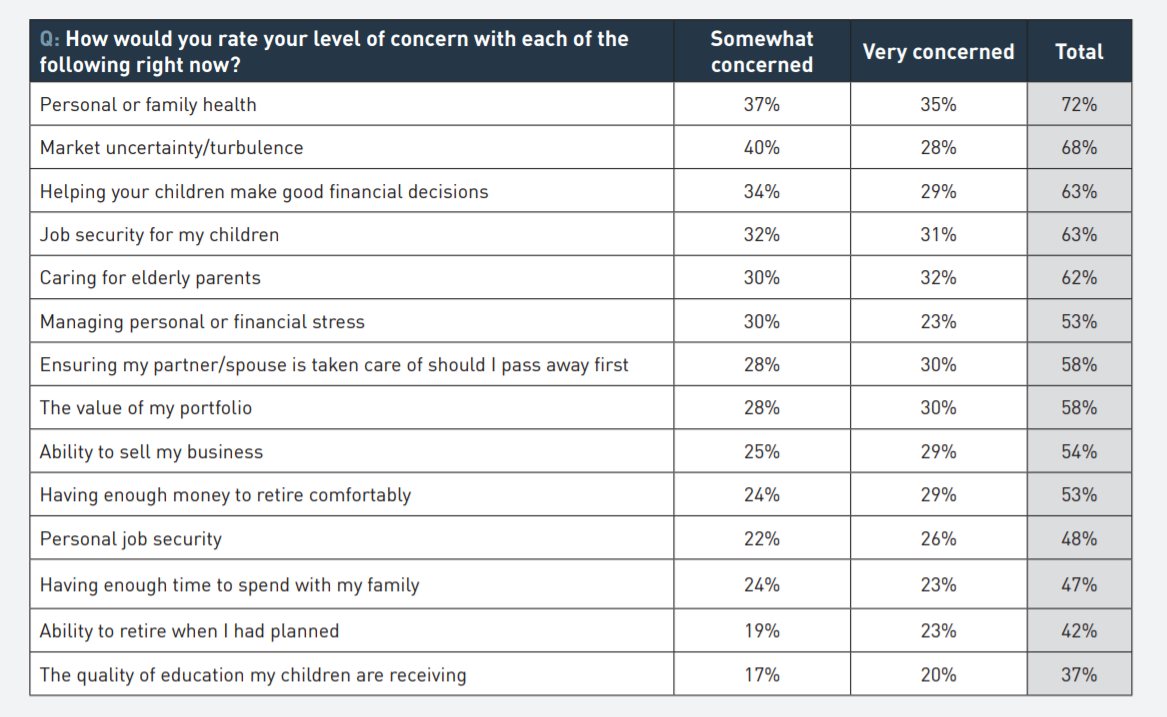I’ve often quipped that when you hear the words “I’m fine”, it’s a trap. We know this in our personal relationships but the same is true with our clients.
So yes, in a personal relationship “I’m fine” might mean:
“I’m not fine in the least and I just don’t want to talk about it.”
or
“If you don’t know what’s wrong with me, I’m not going tell you.”
But when it comes to your clients it’s just as likely to mean that, in the context of their conversation with you, they are fine. There are no big tragedies in their lives. They have no massive financial concerns. They are, for all intents and purposes, “fine”.
But are they?
We asked 750 high net worth investors to rate their level of concern with a range of issues as part of our on-going investor research in partnership with the Investments & Wealth Institute.
It seems they are not that fine at all.

Why Does it Matter?
Understanding client concerns is, of course, a nice thing to do. You care about your clients, so you’re naturally interested in what’s on their minds. But there’s more.
1. There may be an impact on their financial plan even if that impact seems tangential.
For example, high levels of stress may mean a client should consider working less. Concerns about the family may suggest a need for insurance. Caring for elderly parents may mean allocating savings differently to ensure your clients can support the family.
2. There may be an opportunity to demonstrate leadership.
Understanding what is on the minds of your clients can help you share communications or focus your conversations on the things that really matter to them. Something as simple as an article on staying healthy demonstrates that you listened. Or perhaps you would consider something more complex such as creating a ‘study group’ for your business owner clients to discuss strategies to increase business value or transitioning a business to the next generation.
3. There may be a more insidious impact on your clients’ ability to make decisions or take action.
If, as your client sits down with you for a review meeting, he or she is struggling with managing stress, there is some chance they won’t hear what you have to say. They may feel ‘frozen’ and unable to make important decisions that could impact their family or financial future. Simply naming that lurking concern may be the start to breaking through.
Getting the Questions Right
When we share the research on ‘client concerns’, it all seems quite obvious which are most common. That’s misleading when it comes to your individual clients.
When we see that 72% of clients are concerned about health and wellness it’s easy (if not mathematically accurate) to assume that all our clients are about 72% concerned about it. Of course it’s binary– three quarters of clients are concerned and a quarter are not. That means we need to dig in to understand what is on the minds of individual clients.
The true challenge, of course, is teasing out these concerns in way that will be helpful for both yourself and your clients. We’ve always been taught to ask open-ended questions but they can be challenging when it comes to uncovering concerns.
The obvious question is this. “Is there anything that is concerning you right now?”
But that may not be helpful.
- I may assume you want to know if I’m concerned about my financial situation. The result? “I’m fine.”
- I may be taken off-guard and not really know what to say. The result? “I’m fine.”
- I may get trapped in my own mind and start self-editing. “What right do I have to talk about my concerns with my children’s online education when people are dying.” The result? “I’m fine.”
- I may not have articulated the concern to myself, so I don’t have a simple ‘label’ for the feeling. The result? “I’m fine.”
I believe we need to get very good at asking questions in the right way and that means:
- Giving clients time to consider the response. Don’t put them on the spot.
- Providing them with examples so they know they are not alone. “For example, many of my clients have told me they are concerned about…..”
- Going a few levels deeper to help clients articulate and label their concerns.
“But I can’t fix those problems.”
I can hear you saying it now and I get it. You cannot solve for all of the concerns your clients are feeling. And that’s ok.
Your job is to identify those that may impact the work you are doing together, now or in the future. For everything else, consider that knowledge a “gift”, one that will help you provide targeted, value-added communications to demonstrate leadership and drive deeper engagement.
My name is Julie Littlechild and I’m not always that fine.
Thanks for stopping by.
Related: Are You Speaking the Same Language as Your Clients?


